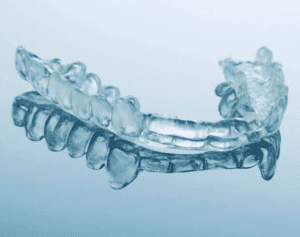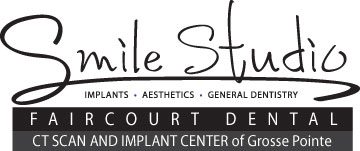
Temporomandibular joint and muscle disorders, commonly called “TMJ,” are a group of conditions that cause pain and dysfunction in the jaw joint and the muscles that control jaw movement. We don’t know for certain how many people have TMJ disorders, but it is estimated that over 10 million Americans are affected.
What Is TMJ Short For?
TMJ stands for temporomandibular joint, which is the joint that connects your jawbone to your skull. TMJ disorders refer to a variety of conditions that affect this joint and the surrounding muscles.
What Are The Causes?
Sometimes the main cause is excessive strain on the jaw joints and the muscle group that controls chewing, swallowing, and speech. This strain may be a result of bruxism. This is the habitual, involuntary clenching or grinding of the teeth. However, trauma to the jaw, the head, or the neck may cause TMD.
Arthritis and displacement of the jaw joint disks can also cause TMD pain. In other cases, another painful medical condition such as fibromyalgia or irritable bowel syndrome may overlap with or worsen the pain of TMD. A recent study by the National Institute of Dental and Craniofacial Research identified clinical, psychological, sensory, genetic, and nervous system factors that may put a person at higher risk of developing chronic TMD.
What Are The Symptoms?
The symptoms of TMJ disorders can vary, but they often include:
1. Jaw pain or tenderness: This can be felt in the jaw joint area, around the ears, or in the muscles of the face and neck.
2. Clicking or popping sounds: You may notice noises when you open or close your mouth, which can be a sign of a misaligned joint or disk.
3. Difficulty in opening or closing the mouth: This can range from mild discomfort to severe limitation in jaw movement.
4. Headaches: TMJ disorders can cause headaches, especially ones that are felt around the temples or at the back of the head.
5. Ear pain or ringing in the ears: Some individuals with TMJ disorders may experience ear pain or a sensation of ringing or fullness in the ears.
6. Jaw locking: In some cases, the jaw may get stuck or lock in an open or closed position.
It is important to note that these symptoms can also be caused by other conditions, so it’s best to consult with a dental professional who can properly evaluate your symptoms and provide a diagnosis.
Treatment
Dr. Mary Sue Stonisch is trained in treating TMJ. The Kois Deprogrammer is one TMJ option for treatment. It is a dental device used to treat temporomandibular joint (TMJ) disorders and to balance the bite. It is designed to encourage the relaxation of the muscles involved in chewing and closing the jaw.
The Kois Deprogrammer is a removable orthodontic appliance made of clear acrylic material. It is worn in the mouth and helps to alleviate stress on the jaw joints and muscles by repositioning the jaw in a more relaxed position. By doing so, it can help alleviate symptoms of TMJ disorders like jaw pain, headaches, and difficulty in opening and closing the mouth.
 The Kois Deprogrammer works by creating an optimal bite position by separating the teeth and repositioning the jaw. This helps to identify any imbalances in the bite that may be causing the TMJ disorder. However, it is important to note that a Kois Deprogrammer is just one component of a comprehensive treatment plan for TMJ disorders. It is typically used in conjunction with other treatment modalities, such as physical therapy and occlusal adjustments.
The Kois Deprogrammer works by creating an optimal bite position by separating the teeth and repositioning the jaw. This helps to identify any imbalances in the bite that may be causing the TMJ disorder. However, it is important to note that a Kois Deprogrammer is just one component of a comprehensive treatment plan for TMJ disorders. It is typically used in conjunction with other treatment modalities, such as physical therapy and occlusal adjustments.
If you have concerns about your bite or TMJ symptoms, it would be best to consult with Dr. Stonisch who can provide a personalized assessment and recommend appropriate treatment options for you.
Contact our friendly smile team at 313-882-2000 to schedule a consultation with Dr. Stonisch for treatment options for your TMJ symptoms.



